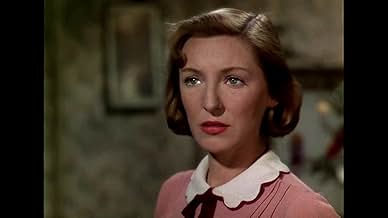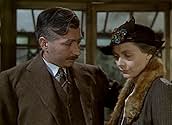IMDb RATING
7.3/10
4.5K
YOUR RATING
A chronicle of the lives of the Gibbons family, from shortly after the end of World War I to the beginning of World War II.A chronicle of the lives of the Gibbons family, from shortly after the end of World War I to the beginning of World War II.A chronicle of the lives of the Gibbons family, from shortly after the end of World War I to the beginning of World War II.
- Awards
- 1 win total
Robin Burns
- Man in Crowd
- (uncredited)
Mabel Etherington
- Lady in Crowd
- (uncredited)
Dan Lester
- Man in Crowd
- (uncredited)
7.34.4K
1
2
3
4
5
6
7
8
9
10
Featured reviews
A gem
Whether or not, one agrees with the "truth or morality" of Noel Coward's ennobling view of the British "bourgeois" from 1919-1939, the acting and direction in "This Happy Breed", are superb, and what a cast. I think the notion of sacrifice, pride, and work ethic, might have easily been written about many similar low and middle income families in America from Brooklyn to San Francisco, during the same period, as it was portrayed in the equally, excellent film, "Best Years of our Lives" (1946)
A very British class act
Old-fashioned? Arch dialogue? Stiff acting? Viewable only as an historical document? Guilty on all counts, but this film still captivates. Made during the second World War, it was probably intended as a flag-waver, a morale booster for the worn-down citizens of Britain, but in fact is much more than that. The story (Noel Coward) deals with the lives and times of an ordinary family in 'between the wars' London. There is nothing dramatic, just the everyday events and the weddings, births and funerals that visit us all. However, there are some wonderfully quiet scenes - the father-to-son talk before the son's wedding is especially notable for its old-fashioned moral uprightness, the way the camera lingers in an empty room when the family learns of a terrible road accident, and Frank's gentle chat with his neighbour over a few glasses of whisky as they prepare to go their separate ways. Director David Lean handles these with care and reserve. The way the family deals with the mini-dramas that beset them was no doubt meant to say to the war-weary people that we may be a middling, grey little society with predictable ways, but it was worth fighting for. The film always leaves me a little melancholy, missing an age that still existed in many ways when I was a youngster. No doubt to a modern cinema audience that can't manage without an explosion or car-chase every ten minutes this would be regarded as dull and boring, but I love its charm.
Enjoyed this little gem
I throughly enjoyed this little gem of a film. It is very well acted and it was nice to see a smart well groomed Robert Newton being a million miles away from Long John Silver. It had some laughs,some drama and quite a bit of sadness and as you get to know the different characters you feel a genuine fondness for them. I was brought up in the 1950's and recall visiting relatives who had grandmas and spinster aunts living with them, just like in this film. Though there is bickering and some harsh words used by the family, it does represent a time when families stuck together and deep down loved and respected one another. If you get the chance to see this movie, then I am sure that you will enjoy it.
Up there with the very best. Wonderful !
This film caught me completely unawares. I had never heard of it until it presented itself on daytime television one afternoon. I really dislike this type of film, as I find most of the time is spent on mediocre happenings in predictable situations. (Ordinary peoples lives are very boring). I was therefore amazed at the fact that I couldn't leave it, Maybe it's because I am getting older or maybe the people in this film reminded me of the adults of the 1950's when I was a child.
The acting is absolutely superb, you really believe in this family and the ups and downs of their lives. The direction of David Lean polishes the excellent cast performance, what more can I say ! ......Fantastic.....
The acting is absolutely superb, you really believe in this family and the ups and downs of their lives. The direction of David Lean polishes the excellent cast performance, what more can I say ! ......Fantastic.....
Twenty years between wars in the history of a British family
The Gibbons family is "This Happy Breed," a 1944 film starring Robert Newton, Celia Johnson, Sterling Holloway, John Mills and Kay Walsh. The story begins with the end of World War I in 1919 with the return of Frank Gibbons (Newton) to his family - wife Ethel (Johnson), son Reg (John Blythe) and daughters Queenie (Kay Walsh) and Vi (Eileen Erskine) as they begin their life in a new home. The next 20 years bring weddings, births, tragedy, and death, as it does to all of us. Queenie is being courted by a sailor, Bill (Mills) who wants to marry her, but she wants to better her class and says she can't be happy with him; Vi falls in love and marries, as does Reg. Frank becomes a travel agent after the war and finds that one of his service friends (Holloway) lives next door. They become best buddies and provide the film's humor as they attempt to drink in secret. Ethel meanwhile has to cope with two somewhat difficult characters: the hypochondriacal Aunt Sylvia (Alison Leggatt) and Ethel's mother (Amy Veness) who live with them.
One thing interesting about British films that deal with the war - "In Which We Serve," "The 49th Parallel," and this one, for instance - one is made aware of the hardships, loss, sacrifice and sadness, while American films have a much more romantic quality to them. Though "This Happy Breed" ends just at the dawn of World War II, there is discussion of the European situation, fascism, and a general fear of another war in light of what they all went through in the last one.
"This Happy Breed" is another triumph, though an unsung one, for two wonderful artists - David Lean and Noel Coward, who worked together in this film, "Blithe Spirit" and "In Which We Serve" and had so many brilliant accomplishments on their own. The Gibbons feel like a real family, with a no-nonsense, hard-working matriarch, her more relaxed, emotional husband, and three children who go their separate ways in life and meet turmoil, normalcy, or tragedy. The most touching scene in the movie for me was the talk that Frank has with Reg before his wedding. "Always put your wife first," Frank says after he finally gets Reg to stop kidding around and listen to him.
I wasn't expecting this slice of life to be a tear-jerker, but it was, due to the beautiful acting of Celia Johnson and Robert Newton especially. They are the rocks of the film, providing its center. When Queenie runs off with a married man, she is shunned and disowned by Ethel, yet one can tell just by her movements that she is as heartbroken and worried as she is angry. Frank seems to accept what she says, yet once he's alone, he breaks down and sobs.
"This Happy Breed" sneaks up on you; before you know it, you're involved with the Gibbons. They're the stuff Britain is made of, the stuff that gets the country through its darkest times. A little gem; don't miss it. Oh, and I knew that was Laurence Olivier's voice in the beginning.
One thing interesting about British films that deal with the war - "In Which We Serve," "The 49th Parallel," and this one, for instance - one is made aware of the hardships, loss, sacrifice and sadness, while American films have a much more romantic quality to them. Though "This Happy Breed" ends just at the dawn of World War II, there is discussion of the European situation, fascism, and a general fear of another war in light of what they all went through in the last one.
"This Happy Breed" is another triumph, though an unsung one, for two wonderful artists - David Lean and Noel Coward, who worked together in this film, "Blithe Spirit" and "In Which We Serve" and had so many brilliant accomplishments on their own. The Gibbons feel like a real family, with a no-nonsense, hard-working matriarch, her more relaxed, emotional husband, and three children who go their separate ways in life and meet turmoil, normalcy, or tragedy. The most touching scene in the movie for me was the talk that Frank has with Reg before his wedding. "Always put your wife first," Frank says after he finally gets Reg to stop kidding around and listen to him.
I wasn't expecting this slice of life to be a tear-jerker, but it was, due to the beautiful acting of Celia Johnson and Robert Newton especially. They are the rocks of the film, providing its center. When Queenie runs off with a married man, she is shunned and disowned by Ethel, yet one can tell just by her movements that she is as heartbroken and worried as she is angry. Frank seems to accept what she says, yet once he's alone, he breaks down and sobs.
"This Happy Breed" sneaks up on you; before you know it, you're involved with the Gibbons. They're the stuff Britain is made of, the stuff that gets the country through its darkest times. A little gem; don't miss it. Oh, and I knew that was Laurence Olivier's voice in the beginning.
Did you know
- TriviaThe voice of the uncredited opening narrator is that of Laurence Olivier.
- GoofsFrank is shown reading a copy of the 16 September 1930 edition of the Daily Mirror with the headline story about the elections in Germany held on 14 September where the Nazi Party increased their seats in the Reichstag from 12 to 107. He then goes to the back yard to help shake out the tablecloth, but the cherry tree there is still in full bloom, months after the blossoms should have disappeared.
- Quotes
Frank Gibbons: She didn't pass on, pass over, or pass out! She died!
- Crazy creditsOpening credits prologue: This is the story of a London family from 1919 to 1939.
- ConnectionsFeatured in Jonathan Ross' Must-Watch Films: Crime Films (2023)
- SoundtracksRule Britannia
(uncredited)
Lyrics by James Thomson
Music by Thomas Augustine Arne
Sung by Robert Newton (Frank) and Stanley Holloway (Bob) coming home after their reunion
- How long is This Happy Breed?Powered by Alexa
Details
- Release date
- Country of origin
- Language
- Also known as
- Srecna porodica
- Filming locations
- Alderbrook Road, London, Greater London, England, UK(exteriors of family house near corner with Bellamy St. - still standing in 2022)
- Production companies
- See more company credits at IMDbPro
Box office
- Budget
- £200,000 (estimated)
- Gross worldwide
- $158
- Runtime
- 1h 55m(115 min)
- Aspect ratio
- 1.37 : 1
Contribute to this page
Suggest an edit or add missing content

































